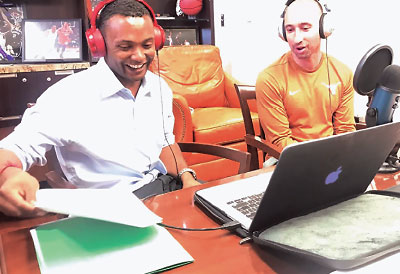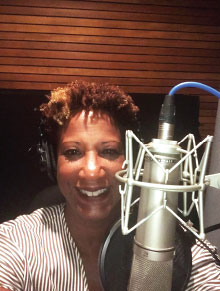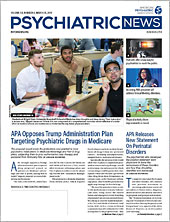Shaka Smart, head coach of the University of Texas men’s basketball team, is used to giving interviews—it’s part and parcel with leading a nationally followed athletic program. Today’s talk is a bit different though. Rather than talk about an upcoming game or his team’s recent performance, Smart will discuss student-athlete mental health with Austin psychiatrist Gregory Scott Brown, M.D.
The conversation is one installment of Brown’s weekly podcast, titled “This Is Mental Health.” The series features conversations between Brown and people outside the psychiatric profession who are advocates for mental wellness. Brown has found these podcasts to be a valuable platform for fostering positive discussions about mental health. “I hope to show that people from all walks of life are thinking about improving mental health,” he said.
Brown is just one of many psychiatrists who are creating podcasts to communicate with the public. From a pure metrics perspective, it makes sense. Podcasts are exploding in popularity: between 2013 and 2018, the percentage of Americans who listened to a podcast at least once a month more than doubled from 12 percent to 26 percent. Moreover, the average listener tunes in to about five podcasts a week.
“In our profession, we spend a lot of time talking with patients, avoiding down time, and following stories to see where they lead,” said Jessica Gold, M.D., an assistant professor of psychiatry at the Washington University School of Medicine in St. Louis and a member of APA’s Council on Communications. She co-hosts a podcast called “Psyched!” “Once you understand some of the basics of the technology, it can be an easy transition,” she continued.
In her case, Gold learned the technology side from co-host David Carreon, M.D. The pair started “Psyched!” in 2017 when they were both residents at Stanford University. The program covers various topics in psychiatry and neuroscience that are both engaging and informative, Gold told Psychiatric News.
“Some people may do podcasts for recognition, but I think you have to really like the stories you are doing in order to thrive, since recording and editing are time-consuming processes,” she said.
Gold added that working with a partner helps divide the work while also making the process richer by having someone to riff off with.
“Podcasting is a commitment, but in the grand scheme, I have found the time to be worth it,” Brown agreed. “I’m hearing lots of positive feedback from folks in the Austin community about how my discussions helped them think about, and talk about, wellness more.”
Brown has said that podcasting has also been a tremendous learning experience. “I have the chance to interact with all these amazing people—one week it’s a yoga instructor who is helping people deal with trauma, and the next I’m speaking with the head of a chamber orchestra about the role of music in improving mental health,” he said.
“Podcasting has definitely allowed me to grow as a psychiatrist,” said Janet Taylor, M.D., M.P.H., a community psychiatrist in Sarasota, Fla., and a member of APA’s Council on Communications. She hosts the podcast “Sex, Lies, and Medical Cannabis With Dr. Janet” and covers a range of topics from how to properly read the label on cannabidiol extract to–yes—how cannabis affects sex.
Taylor started her podcast a few months back after taking a course on medical cannabis when she moved to Florida, where medical cannabis is legal. “It dawned on me how little I knew about this subject,” she told Psychiatric News. “And if I didn’t know anything, what did the average consumer of medical cannabis understand?”
Because of federal and state rules, she cannot discuss medical cannabis at her community clinic. A personal podcast offered a workaround.
With previous media experience, including radio spots, Taylor was familiar with the production side of podcasting. For her, the learning curve has been marketing. “Once you have a product, you have to get out there and sell your brand,” she said. “That not only attracts listeners, but also guests for the show.”
While it may seem daunting for some psychiatrists, Taylor added that marketing oneself is not difficult; psychiatrists are already engaging in “marketing” activities but may simply not realize it.
Most podcasts can be downloaded from the Apple store or Google Play. ■


